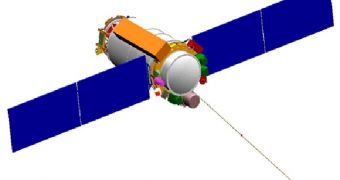On Friday, Russia announced having managed to successfully launch its newest satellite into orbit, and that the probe already began sending back data. What makes this launch more special than others is the fact that the Coronas Photon is the most important scientific device the Russian Federation deployed to orbit in the last four years. Its main role is to analyze the interactions between the Earth and the Sun, and, more specifically, what happens when charged particles coming from the star hit the protective layers of our planet's magnetic fields.
The Plesetsk Cosmodrome in Northern Russia was the launch site for the new mission, which delivered the 4,200 pound (roughly 2,100 kilograms) solar observer into a 310 mile-high orbit above the Earth. The satellite was carried in space onboard a Tsyklon 3 rocket, which functioned without a glitch following the 1330 GMT (8:30 am EST) take off. Officials from the Russian space agency, RosCosmos, said that the newest probe only needed 45 minutes to reach its designated altitude, and that it began sending back telemetry just 15 minutes later.
Since 2004, when the country's largest satellite was lost due to a failure recorded in the third stage of a Tsyklon 3 delivery vehicle, the nation has only sent smaller satellites in space, mostly for communication and navigation. Scientifically speaking, the new mission is the most important in years, and comes to complete previous solar reconnaissance missions performed by the Russians, in 1994 and 2001. Both Coronas Photon's predecessors completed their mission flawlessly.
In charge of development for the new project was a team of researchers from the Moscow Engineering Physics Institute, aided by a group of builders from the Research Institute for Electromechanics, also in Moscow. The main reason they focused on constructing a solar probe was the fact that solar radiations affect most aspects of our daily lives, including the way we communicate, travel, or perceive our weather. Radiations coming from the Sun are also extremely dangerous to astronauts and satellites in orbit around the Earth.

 14 DAY TRIAL //
14 DAY TRIAL //